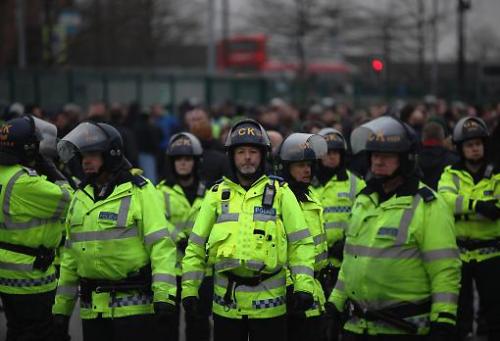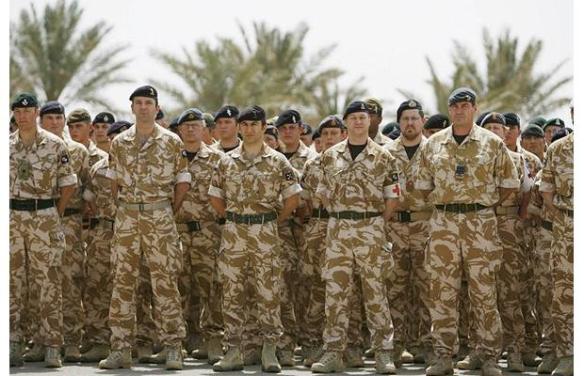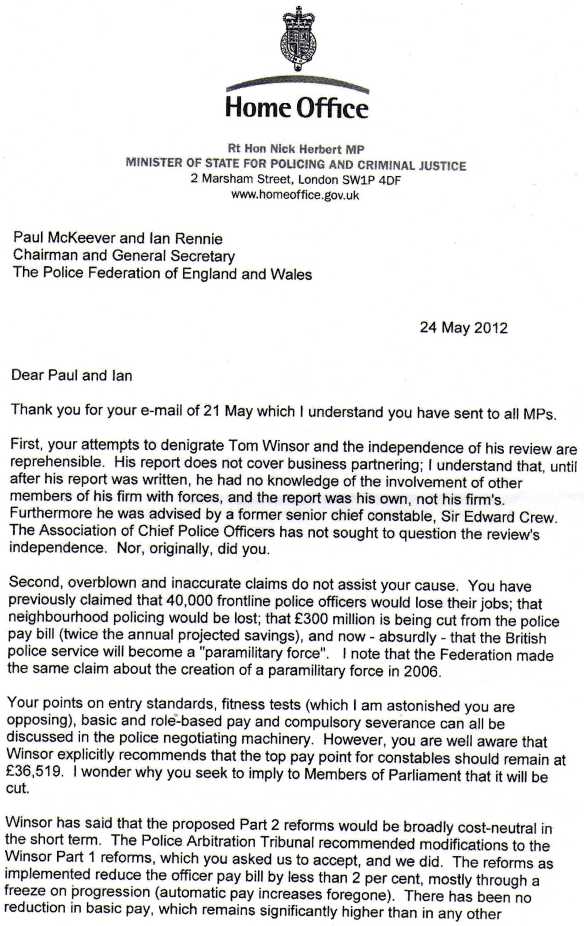
http://www.newstatesman.com/politics/politics/2012/06/regression-mean
I saw this article on Twitter this week. Written by Sir Ian Blair. The above link takes you to the article online. He raises some very good points. Clearly he has only spent his whole life in Policing and he has never been a rail regulator so this government will ignore his concerns.
This is of course the same government that have now performed U turns on a number of their budget policies. The same government who have been found to be riddled with corruption, nepotism and general incompetence. The problem with messing with Policing is that once you’ve made the experienced staff redundant, slashed the wages and lost the infrastructure you can’t just do a quick U turn. The organised criminals will be stronger, richer and more confident than ever. The cuts and radical reforms must be stopped now. Join in with the #AntiWinsorNetwork. Sign the E petitions http://epetitions.direct.gov.uk/petitions/32177 and speak to your MP’s.
The Conservative-led coalition government has taken a series of connected decisions about the police. First, it has consistently rehearsed the view, returning to their 1993 white paper on the subject, that “the main job of the police is to catch criminals”. That is indeed a crucial part of policing but there are many others. By concentrating so narrowly on crime and detection, the Conservatives have inexplicably ignored the preponderance of criminological theory and professional police opinion across the world. This categorically suggests that crime can be best controlled through a wider approach by the police, attempting to interact with the whole community in order to build legitimacy and consent.
Second, the government has reduced funding for the police more severely than for most other parts of the public sector, requiring the service to eliminate 20 per cent of costs over the next four years. This will probably force the police to retreat to an outdated method of working, reacting to crime after it has occurred rather than trying to minimise what gives rise to it. The combination of the first two decisions will drive the service to reduce its involvement in neighbourhoods, take police officers out of schools and put most of them back into their cars responding to emergency calls.
Third, it has deliberately reduced professional police involvement in policymaking and the development of the doctrine of evidence-based policing. It openly criticises the Association of Chief Police Officers, to the point where coalition-run police authorities have begun to starve it of funds. For no coherent reason, the Home Office is scrapping the National Policing Improvement Agency, an organisation that was trying to do what it said on the tin.
Last, in their drive to roll back the state, the Conservatives have legislated to place chief constables under the direct control of individual politicians in a manner never seen in Britain. This will endanger the long tradition of operational police independence.
These four moves threaten with extinction the primary model of British policing – or, more correctly, of policing in England and in a very reluctant Wales, because Scotland has rejected the idea.
Over the course of nearly two centuries, Britain developed a new model of policing, usually described by criminologists such as Robert Reiner as social democratic. This may now be in its death throes.
Policing and politics are inextricably linked. In the end, both are about power and the use of force. Within all nation states, the police are the sole institution empowered to use force on free citizens without needing to seek prior legal permission. Even the words are linked etymologically, through the Greek polis, or “city”: consider politician, political, politic, politics, polity, policy, police and politicised.
Just as with the absence of the rule of law, the absence of an effective police service, as in post-invasion Afghanistan or Iraq, is an emblem of
a failed state. For the police to serve only one political party or politician is a symbol of dictatorship. Precisely because it is so important, policing is a political issue.
However, all democratic states go to great lengths to prevent policing from becoming politicised, especially by stopping one politician or ministry gaining sole control of the police. England and Wales have had (although only until this November) a balance of powers between the home secretary, 43 local chief constables and police authorities, which are made up of local politicians and independent members. Many other countries, such as the United States, Germany and Australia, divide control between federal and local jurisdictions. Others, such as France and Italy, have national forces that answer to competing ministries.
Dr Justice Tankebe, born in a police barracks in Ghana and now teaching at Cambridge University, has defined police legitimacy as depending on “the recognition by citizens of the moral rightness of the police’s claim to authority”. And, in Britain, home of the first force founded on such a principle, that position is in danger.
There is abundant research indicating that citizens grant their consent to the police on fulfilment of two conditions – that “the rules” are both fair and fairly enforced. Two aspects of that fairness are now under threat in the UK. First, there is copious evidence that policing is concerned with far more than crime-fighting, and yet that is how the coalition is defining its role. Second, the police should be independent of party politicians, a position that will be fundamentally altered by the first direct election of police and crime commissioners in November.
Not everything about British policing is in good shape. Moreover, it is a difficult business. Policing deals daily with confrontational and intractable problems; it is a necessary evil, concerned with some of the least pleasant aspects of human behaviour. Yet it is important to recollect that Britain created a style of policing widely copied and respected around the world.
In 2006, during the humanitarian crisis in Darfur, David Triesman, then a minister at the Foreign Office, visited Sudan. Hundreds of miles inland, in one of the world’s most remote and underdeveloped areas, he met a group of refugee women. When they found that he was from Britain, they asked him not only for medicine and blankets, but for British bobbies to protect them.
That single scene points up the extraordinary revolution in policing that Robert Peel achieved in 1829. Before Peel, all policing functions (usually military in nature) were designed to protect the state and its established leaders against peoples subjugated by aristocratic rule or by conquest. The police were concerned with maintaining order and not in any way with protecting the rights of individuals. In Ireland, India and their other colonies, the British already had such constabularies, armed, usually mounted, living in barracks, commanded by commissioned officers. They continued to develop such forces as the empire expanded. It was during Peel’s time as chief secretary for Ireland that the Royal Irish Constabulary was established; the RIC fitted this description exactly.
Safe, just and tolerant
What Peel and the first two Met commissioners, Charles Rowan and Richard Mayne, created in London was something different: an unarmed organisation, without military-style uniforms, low in powers and relatively low in numbers, living in the community and officered not by those who could buy commissions but by those who were promoted on merit. Nor did Peel interfere much in his creation, other than to insist that the primary objectives of the force were the prevention of crime and the maintenance of public tranquillity (not the detection of crime or punishment of offenders).
Four years after the establishment of the Metropolitan Police came the first big test of non-interference. In 1830, after the fall of the Tory government in which Peel served, Viscount Melbourne had taken up Peel’s old job as home secretary in a Whig administration. The Whigs disliked the new police force and were determined to clip its wings.
In 1833, a proto-Chartist demonstration was called in Cold Bath Fields in Clerkenwell, London. Melbourne ordered the commissioners to have it broken up. In the ensuing confrontation, a police officer was killed. The commissioners told the subsequent parliamentary inquiry about the home secretary’s orders and how they had objected to them. Melbourne denied this. The MPs believed the commissioners and backed their authority. A new, independent entity had appeared in the state.
Over the next 40 years, the London model of policing spread throughout Britain and to the large cities of the Anglo-Saxon empire and the United States. But the model also spread as an idea, through the novels of Charles Dickens and Wilkie Collins. In 1874, one of the foremost Royal Academicians of the day, Frank Holl, exhibited his painting Deserted – the Foundling, which shows two officers from the Met rescuing an abandoned infant – probably the first depiction of policing concerned not with the requirements of rulers but the needs of citizens. And steadily, not without difficulties and false turnings, a benign and rather bucolic model of policing began to emerge.
The Met would be sent to break strikes in the Rhondda and Sherlock Holmes would mock Inspector Lestrade; but the British took to their police. The direction of travel was discernibly linear, developing away from control of disorder and crime towards the protection of the public from all manner of difficulties. Egon Bittner, the first academic to study policing from a sociological perspective, was surprised to find that it was concerned much less with crime control and much more with low-level maintenance of order. He gave his landmark 1974 police study the title “Florence Nightingale in Pursuit of Willie Sutton” (a notorious American bank robber in the 1930s) to make the point that the role of the police in practice was enormously wide, and declared that “the police officer and the police officer alone is equipped, entitled and required to deal with every exigency in which force has to be used”. Bittner defined exigency as “something which ought not to be happening and about which someone had better do something NOW”.
This American analysis shows that common-law policing had moved steadily in the direction of helping the public, as the 1962 British royal commission on the police defined part of its task. Shortly afterwards, a new generation of police leaders became persuaded by the “broken windows” theory, put forward by George Kelling and James Wilson in 1982. This suggested that crime and antisocial behaviour occur most frequently in areas neglected by institutions and in physical decline. But doing something about this requires the police to be accompanied and supported by other agents and agencies of social cohesion – bus conductors and park-keepers, trade unions and housing associations. During the Thatcher years, these institutions began to weaken and disappear. The police would be alone.
In 1997, seemingly following this theory, the incoming Labour government declared that the task of the police was to “build a safe, just and tolerant society” and it passed legislation placing a duty of crime reduction on local authorities. Not only did this good intention fail to turn the tide, however, but it was rendered almost irrelevant by the impact of Tony Blair’s mantra “Tough on crime, tough on the causes of crime”.
Blair understood that crime had most impact on Labour voters and so he wrested law and order away from the Conservatives. Successive Labour home secretaries engaged in political battle after battle to be tougher than their Conservative opponents and the police found themselves having to handle the rafts of new criminal offences which characterised policy by the New Labour government. Under these pressures, and acting largely alone, the police service decided that its main response should be to reintroduce an emphasis on neighbourhood policing.
The New Labour years coincided with the Macpherson report into the 1993 racist murder of Stephen Lawrence and then the emergence of Islamist terror. As after the Brixton riots of 1981, the police were pushed further to pursue a quest for renewed legitimacy. A witness at the Macpherson inquiry declared that African-Caribbean people in Britain were “overpoliced and underprotected”; the leaders of British Muslims described themselves as a “watched community”. The effort to overcome this distrust – to become more inclusive of diverse and challenged communities – is the epitome of social-democratic policing.
And this is what is now under threat. It had been hoped that “independent” candidates would run for election as the new elected police commissioners. No chance: these will be party slates. At the Conservative party conference in October, Theresa May, the Home Secretary, produced Colonel Tim Collins of Iraq war fame as the prospective Conservative candidate for commissioner in Kent. He received applause for his view that the police needed to be rat-catchers rather than social workers – although he abruptly withdrew from the race last month.
Not all commissioners will hold such views. But they will be elected on tribal lines and, seeking re-election, they will put continual pressure on the police to deal with matters of concern to their supporters, irrespective of where crime is occurring. How many times will a chief constable, with now almost no security of tenure, stand up to that pressure or insist on dealing with matters such as organised crime or forced marriage, about which the commissioners’ electorates do not care?
There is an old joke that describes how, in heaven, the administrators are Swiss, the cooks are French, the engineers German, the lovers Italian and the police British. In hell, on the other hand, the cooks are British, the Swiss are the lovers, the Italians run the place, and so on. Such jokes are not accidents. The British police do not have the qualities of a celestial constabulary, but something precious in the genetics of the nation is being lost under this government, perhaps irretrievably.
In policing, we are about to regress to the mean. It is particularly ironic that Peel’s own party is involved in driving the partial destruction of his greatest legacy.
Ian Blair was commissioner of the Metropolitan Police from 2005-2008 and now sits as a cross-bench peer. He gave a speech, based on this article, at How the Light Gets In, the festival of philosophy and music at Hay, on 9 June.
















